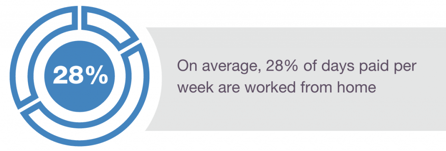Hybrid work arrangements – or combining on-site with remote work – is clearly the trend of the future. The average number of paid days worked from home in 2023 (so far) is 1.4 per week, or 28% of the workweek, though this number has clearly fluctuated over time. “Companies are still trying to figure it out,” Sara Sutton, CEO of remote-work jobs platform FlexJobs, told CNN. “Hybrid is where things will settle.”
3 Questions for Successful Hybrid Work
1. Does remote working fit your business?2. Can your organization afford it?
3. Do you have the expertise to manage it?

The most common point of failure with remote work setup isn’t a problem with remote work per se. Instead, it’s whether the organization has the capability to adequately support remote work. In other words, it’s important to separate out genuine disadvantages or challenges associated with remote work from what recruitment firm Fast Forward Solutions describes as “poor system management.”
In other words, remote working cannot succeed if organizations do not adequately support remote working initiatives. That “poor system management” can then give the impression that remote working itself doesn’t work, causing friction between employees who want more flexibility and employers who want everyone back in the office.
There are competing considerations here. When an employer cannot directly oversee the employee’s activities, it can be hard to determine if the employee is meeting their obligations. Productivity measures through remote working have been mostly but not entirely positive, but productivity doesn’t necessarily capture everything. Remote working can also create artificial barriers to collaboration, communication, and coordination between team members that, even if productivity isn’t strictly affected in the short term, can affect work relationships and company culture over the long term.
So, how can you know if remote working will work at your organization and if you will avoid problems related to poor system management?
1: Does remote working fit your business?
Part of what makes these questions so tricky is there’s no one-size-fits-all answer. Every business is unique. Some businesses cannot function remotely. For instance, retail establishments require a physical location to sell their products. Other companies might find that remote work is not conducive to their operations. For instance, they may need to interact with clients in person or use specialized equipment. Where does your company fall?
2: Can your organization afford it?
If remote working can work with your type of business, you might still run into issues, but most of the complaints about remote working can be overcome with adequate investment in the infrastructure and software to support it. However, this may mean paying for licenses to online collaboration, project management, and video conferencing services as well as hardware to ensure workers have all the equipment and internet connectivity they need. These costs can add up.
3: Do you have the expertise to manage it?
One issue that businesses can run into: managing employees remotely can require different skills – or differing levels of proficiency in those skills – then managing them locally. For example, it’s often easier to see if a worker is struggling when they’re nearby than when they’re at home. This means leaders have to adapt how they lead. A failure of leadership should not be automatically ascribed to a failure of remote working.
Ultimately, deciding whether to switch to hybrid work or return to the office is a big decision that involves considering the company’s own unique circumstances.
CoAdvantage, one of the nation’s largest Professional Employer Organizations (PEOs), helps small to mid-sized companies with HR administration, benefits, payroll, and compliance. To learn more about our ability to create a strategic HR function in your business that drives business growth potential, contact us today.


%20(12).png?width=300&name=Blog%20Image%20Template%20(WordPress)%20(12).png)